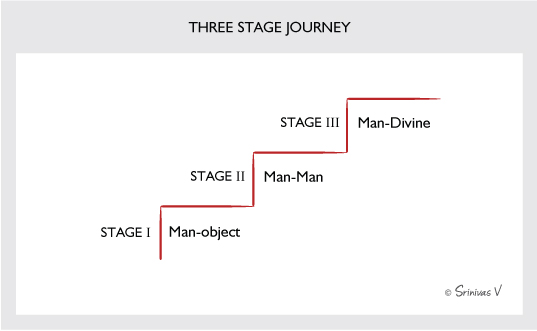The Bhagwad Gita, according to Swami Ranganathananda (one of its foremost interpreters) views man’s journey of evolution as a three stage journey.
The first stage of this is secular (Man-Object) and deals with man’s relationship to objects and acquisitions.
Stage two deals with man’s relationship to man. This step is both secular and spiritual and is a vital stage in the journey of spirituality.
The third stage is of man relationship to the divine – dynamic spirituality.
Enlightened Citizenship represents intermediate and vital bridge step between worldliness and spirituality. This is a very powerful vision for people and provides a strong ideal for every individual to hold on to.
Developing man’s relationship with the divine may take a lifetime. However, a person can definitely move from “man’s relationship to objects” to “man’s relationship with man”.
The first stage is a very low state – here you are in a state of acquisition. It is a quantitative state of mind, the world is seen terms of the things that you own, things that you do physically, the number of accouterments that you have got.
When you escape this, you reach a point where you focus on the stage 2 – “man’s relationship to man”. Then there is a measure of equality in your relationships. Here you view people for who they are and you also view yourself for who you are rather than what you have.
This journey from “man’s relationship to objects” to “man’s relationship to man” itself is a big step. You become “inside-out“.
This is what Swami Vivekananda called ‘man-making’: at first you live in cowardliness; then you learn to live in manliness with infinite courage, infinite strength, infinite sense of the glory of your own self, your infinite potential and the possibilities that sit in you.
Once you have developed manliness then you have something to surrender. (To surrender prior to that is the surrender born out of weakness.)
Enlightened Citizenship is the art, science and practice of the second stage.


